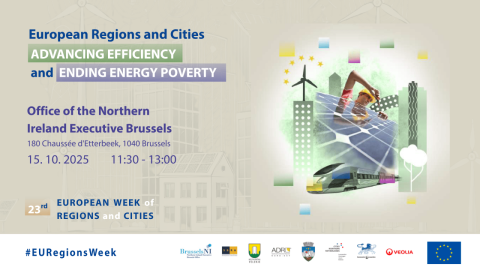
Experts will highlight the critical role of energy savings in ensuring a fair and inclusive energy transition. By sharing best practices in energy efficiency, addressing the challenges facing cities and emphasising the importance of EU cohesion policy, the speakers, together with the audience, will explore how to reduce costs on the path to achieving climate neutrality and combat energy poverty across Europe. The session will be highly interactive, encouraging participants to share their experiences and to actively contribute to the conversation. The debate aims to identify key priorities for cities striving to create energy-efficient, resilient and livable neighbourhoods for the future.
- Climate and environment | Cohesion | Digital and ICT | Energy | EU/ European | Industry, entrepreneurship and SMEs (enterprise/ startup/ business) | International | Local and regional | Rural | Social inclusion and Equality | Sustainable | Urban
- Code: 15PD252001
- Office of the Northern Ireland Executive Brussels, 180 Chaussée d'Etterbeek, Brussels, Belgium
Speakers
Moderator
Practical information
- When
-
Wed 15/10/2025, 11:30 - 13:00 CET
- Where
- Office of the Northern Ireland Executive Brussels, 180 Chaussée d'Etterbeek, Brussels, Belgium
- Type of partnership
- Regional partnership
- Format
- Political/policy debate
- Theme
-
Cities building tomorrow
- Language
- English

Partners

Municipality of Velenje

Suceava Municipality

Office of the Northern Ireland Executive in Brussels

Municipality of Leeuwarden
Reporting
Session summary
The speakers collectively concluded that achieving ambitious climate and energy goals (notably, climate neutrality by 2030 in Velenje and Suceava) relies on a shared set of interconnected strategies that blend high-level planning with targeted local action and citizen support.
These critical elements are:
• Ambitious, Structured Planning: Cities like Velenje and Suceava are demonstrating that climate targets are achievable through comprehensive, multi-phase plans, such as Velenje's heating system overhaul and Suceava's focus on sustainable infrastructure and energy performance in public buildings.
• Targeted Citizen Engagement and Support: Success hinges on empowering residents, particularly those facing energy poverty (Leeuwarden, Northern Ireland). This is achieved through dedicated one-stop shops and digital tools (Velenje's EVA tool), financial mechanisms like subsidies and EU-funded projects (ELENA, SCEPA), and the Leeuwarden model of Energy Coaches who provide empathetic, lived-experience support for behavioral change.
• Digital Innovation and Coordination: Addressing regional challenges, including social deprivation and rural complexities (Northern Ireland), requires coordinated planning supported by the deployment of smart energy initiatives and the ability to scale up digital solutions for smarter energy management.
• Collaboration and Flexibility: The ultimate takeaway is the necessity of an approachable, flexible strategy (Leeuwarden) and the commitment to strengthening cross-border collaboration (Northern Ireland) to share knowledge, pool resources, and effectively tackle complex issues that span geographic and socioeconomic boundaries.
The roundtable concluded that citizen trust and engagement are critical for cities to advance EU energy goals, with municipalities using climate facilitators and inclusive decision-making to foster participation. Speakers highlighted the long-term benefits of EU-funded strategies, which enable cities, to test innovative approaches and educate citizens on energy consumption. Finally, participants called for the EU to ensure faster decision-making, better funding access and policy coherence, especially in complex cross-border areas.







